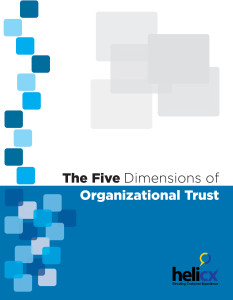The Trust Factor
Creating Win – Win Relationships
Part One
Dramatically increase your effectiveness with others as you learn the principles and skills of trust and interpersonal dialogue.
When trust is absent, relationships are characterized by an adversarial attitude: me vs. you; us vs. them. Rather than goodwill, there are deep and hidden animosities. Respect is lost and our performance is compromised as our energies go into manipulation and protection rather than working together towards a shared vision.
We believe that the most successful organizations of the 21st century will be those that know how to create a climate of trust and goodwill among their employees.
What You Will Gain
In this program, you will learn how to interact with others in ways that build trust and win-win outcomes.
Specifically, you will:
- Learn the core elements of trust.
- Identify how we engage in collusive, weakening patterns of relating to others.
- Experience a change of heart and know how to break out of collusive patterns.
- Come to view others in a way that promotes unity, trust, and goodwill.
- Understand the three phases of interpersonal dialogue and practice the dialogue skills.
- Commit to interacting with others in strengthening rather than weakening ways.
- Develop the ability to confront poor performance and behavior problems.
Structure and Format
The Trust Factor consists of eight modules (two to three hours each) that are scheduled and delivered at least one week apart. The training comes alive as you participate in experiential exercises and role-playing that help you internalize the principles and skills that are taught.
Part Two
1. The Trust Imperative
- Appreciate the need for a collaboration in our interdependent society.
- Learn the definition and key elements of trust.
- Evaluate the consequences of high and low trust within an organization.
- Understand the importance of being trustworthy in building trust and rate your trustworthiness.
- Receive feedback from others about your personal trustworthiness.
2. Collusion
- Understand the dynamic of collusion.
- Be able to identify and diagram collusive relationships.
- Write a personal story of collusion.
- Evaluate the consequences of collusion.
3. A Change of Heart
- Learn the four reasons we engage in collusion.
- Identify payoffs and prices from our collusions.
- Understand the folly of trying to get others to change.
- Learn the two ways of being in our relationships with others.
- Experience a change of heart towards others.
- Learn and practice the skill of creating safe and trusting conditions.
4. Face-to-Face Communication
- Explore the role of communication in interpersonal relationships.
- Learn about alternative ways of communicating/influencing others.
- Identify your “native tongue” or preferred style of communicating.
- Understand the consequences of an absence of dialogue.
5. Interpersonal Dialogue: Core Principles
- Understand the definition and meaning of interpersonal dialogue.
- Learn a model and the core principles of dialogue
- Understand why mutuality is the “bedrock” of dialogue.
- Learn how to create a pool of shared understanding.
- Know how to solve problems in a win-win way.
- Do a self-assessment of your skills in interpersonal dialogue.
- Receive feedback from others regarding your dialogue skills.
6. Interpersonal Dialogue: The Steps
- Learn the steps of dialogue.
- Practice the skills of mutuality.
- Learn and practice various inquiry skills.
- Understand the meaning and guidelines of advocacy.
- Know how to identify and share your left-hand column.
- Practice using the skills of dialogue.
- Identify actions to improve your ability to engage in dialogue.
7. Harnessing Harmful Behavior
- Learn to confront behavior that fails to meet your expectations.
- Understand the importance of discipline and conformity in building trust.
- Develop a set of non-negotiables for those whom you lead.
- Practice the skill of harnessing harmful behavior.
- Apply the skill to back-home situations.
8. Strengthening Our Relationships
- Understand the characteristics and consequences of codependency.
- Know the difference between responsibility for and responsibility to another.
- Learn a credo for your relationships.
- Understand what you do that weakens others when you intend to help.
- Learn the valuing process as a skill to strengthen others.
- Evaluate what you do to strengthen others in your relationships.
- Understand how contracting can be used to strengthen yourself and others.
Contact Us!
Testimonials
One of the things that has been a resounding AHA! moment is that it’s created this sense of awareness, of self-awareness, for all of us that I know is one of the goals of the entire program.
The ability to pick and choose what’s right for your company was very good because I don’t like canned solutions.
Of course, we had our doubts, but they proved us wrong. 360 delivers every year for the last three years. We have conducted thousands of days of training. They believe in the program, they care about the participants, they go the extra mile. Also the trainings are taught in Spanish.
Many of our retailers have benefitted from the marketing processes they implemented.
A lot of times companies want to take one event, or one series of meetings and boom, it’s going to fix everything but it’s more of a process. You have to make it part of a program. I’m a CFO so I could cut this from our budget but you really have to make it part of a long term program.
Our participants, they love it. They truly enjoy their workshops and feel they’re beneficial to any body.
I was stunned at the quality of the materials. The stuff was leading edge, very well-produced and very high caliber.
They were truly the first people to really “get” what we were talking about. In that very first interview, we were able to start working toward what we actually might do and how it might work.
The assessments have been extremely beneficial to me. Because in order to manage people to the point they can be the most successful, you have to understand that person. It’s not about understanding that person between 8 and 5, it’s about understanding who that person is, what moves them, what motivates them to the greatest level of success.
“Our interview process, we managed to change it based off things they showed us. The improvements have been good. We’re seeing it with the new employees coming in, we’re building a better team, we’re interacting with them more.”



